The Best Type Of Work Break For Increased Productivity

Every book about succeeding professionally offers a recommendation for work breaks: meditate, go for a walk, talk to co-workers and the list goes on. So what types of breaks are the most effective at recharging before going back to the workday grind?
Researchers at Baylor University in Waco, Texas, have published a study that reveals the best types of breaks to boost energy and focus are short, are taken earlier in the workday and involve something the employee enjoys.
The study, which appears in the Journal of Applied Psychology, surveyed 95 employees over a five-day workweek. Participants were asked to record their breaks, which were defined as "any period of time, formal or informal, during the workday in which work-relevant tasks are not required or expected, including but not limited to a break for lunch, coffee, personal email or socializing with coworkers, not including bathroom breaks." They were required to document the length of each break.
"We took some of our layperson hypotheses about what we believed were helpful in a break and tested those empirically in the best way possible," said Emily Hunter, an associate professor of management at Baylor. "This is a strong study design with strong analysis to test those hypotheses. What we found was that a better workday break was not composed of many of the things we believed."
Those who engaged in the "best" break habits were found to have more energy, concentration and motivation as well as fewer instances of headache, eyestrain and lower back pain.
Researchers found the best time to take a break is mid-morning -- not once an employee becomes burned out in the afternoon.
"We found that when more hours had elapsed since the beginning of the work shift, fewer resources and more symptoms of poor health were reported after a break," the study says. "Therefore, breaks later in the day seem to be less effective."
People are more productive when they take breaks that incorporate activities they enjoy, the study says. This could be a work-related task as long as it is not already assigned to the person.
"Finding something on your break that you prefer to do -- something that's not given to you or assigned to you -- [those] are the kinds of activities that are going to make your breaks much more restful, provide better recovery and help you come back to work stronger," Hunter said.
The study did not determine a definitive length of time for the best break, but found that more short breaks, rather than one long break, are associated with more effective work.
"Unlike your cell phone, which popular wisdom tells us should be depleted to zero percent before you charge it fully to 100 percent, people instead need to charge more frequently throughout the day," Hunter said.
© Copyright IBTimes 2025. All rights reserved.






















